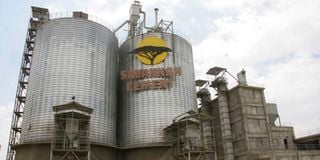Premium
Savannah Cement raises Sh65bn for clinker plant

Savannah Cement Company in Athi River.
Savanah Cement Group has secured a Sh65 billion financing through a privately placed debt deal to develop a clinker manufacturing facility.
The company said the investment will be for the development of the largest single-site cement clinker manufacturing plant in East Africa—joining Bamburi, East African Portland Cement Company, National Cement, and Mombasa Cement which produce their clinker.
“This development puts Savannah in a unique position as we build our company for a solid and sustainable future,” Savannah Cement Group chairman Benson Ndeta said in a statement.
Savannah did not indicate the site of the clinker plant. The company however in 2020 indicated that it planned to build a clinker factory in Kitui.
In regulatory filings, the company said that it had acquired a mineral-rich land in Kitui where it planned to invest in a factory that will extract and grind, and process clinker, a key raw material for cement making.
“Savannah Clinker Ltd is proposing a project which will entail the extraction of raw materials and construction of a clinker plant. The mining process will involve raw material extraction, grinding, proportioning and blending, pre-heater phase, kiln phase, cooling, and final grinding and packing and dispatch,” it said in the 2020 filing.
Cement making involves the mixing of clinker, a key raw material made from limestone or coral mainly from the Coast, with pozzolana, an ash-based product found in the Rift Valley.
Local cement firms have been ramping up their clinker production in recent years to cut a supply deficit, and also gain a competitive advantage by acquiring the key component at a lower cost.
They are expected to expand their clinker plant capacity by 4.4 million tonnes per year, bringing the industry’s production capacity to 10.7 million tonnes by 2025.





